Export diversification goes nowhere as govt project limps
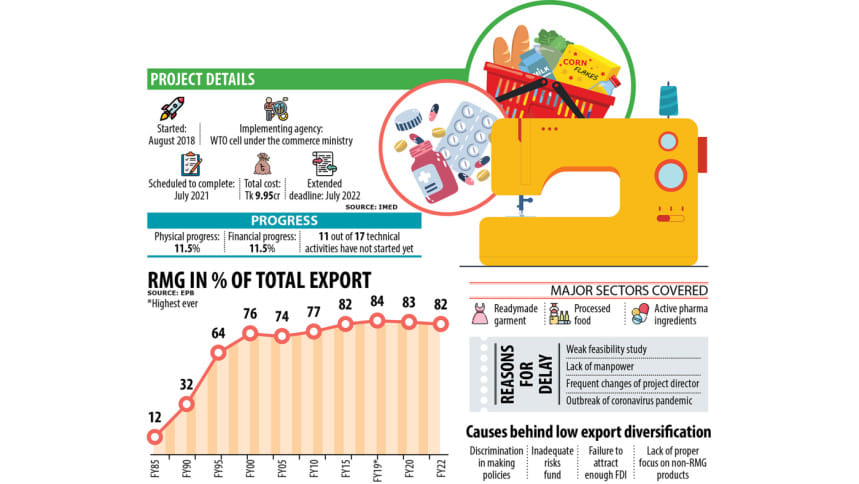
A Tk 9.95 crore project of the commerce ministry aimed at expanding the country's export basket and reducing import dependency has failed to meet its deadline for a second time due to the slow pace of implementation.
In an unpromising sign, the project has only 11 per cent progress after a three-year original schedule and a one-year extension.
The project director was changed a total of six times during the four-year duration, and although six officials could have been recruited for the task, not one person aside from a project director was appointed.
The ministry has failed to implement the project at a time when the country is still dependent on the garments sector, which accounts for about 82 per cent of total exports, according to the Export Promotion Bureau.
The project's goal is to continue assisting in export diversification and expanding the export capacity of select sectors, namely garments, food-processing and active pharmaceutical ingredients, while also reducing import dependency.
The World Trade Organisation (WTO) cell under the commerce ministry is implementing the initiative, which is being funded by the Enhanced Integrated Framework (EIF).
The EIF under the United Nations is the only multilateral partnership dedicated to assisting least-developed countries in using trade as an engine for growth, sustainable development and poverty reduction.
According to its Technical Assistance Project Proposal, the work on the project began in August 2018 and was supposed to be complete by July 2021.
Later, the project deadline was extended to July 2022.
The project could not be completed on time due to the weak feasibility study, a lack of supporting manpower, frequent change of the project director and the outbreak of Covid-19, according to a report of the Implementation Monitoring and Evaluation Division (IMED) of the planning ministry.
The actual physical and the financial progress was 11.5 per cent as of April this year, it said.
In the implementation of the project, 11 out of 17 technical activities yet to begin operations. During the formulation of the project, the authorities did not take proper opinion from the stakeholders, IMED findings showed.
A number of training programmes were supposed to be conducted under the project, which would also appoint local and foreign experts in the garments, pharmaceuticals and food processing sectors.
Of the sectors, project officials completed six of the 40 planned training sessions for food processing and three of the 10 for pharmaceuticals and established a fashion and innovation centre for garments, according to Mohammad Ileas Mia, the current project director.
However, the authorities did not yet complete developing the curriculum for training in the garments sector.
Besides, it is yet to appoint an expert for branding and web development in the apparel industry and procure chemicals for pharmaceutical labs or enterprise solution software.
"If the project is implemented properly, there is an opportunity to create some skilled and trained manpower in the country's garments, food-processing and medicine sectors," the IMED report said.
On the other hand, if the project is not implemented properly, there is a risk of discouraging development partners from financing the project, it added.
Ileas, also a deputy secretary of the commerce ministry, acknowledged the sluggishness while blaming the lack of manpower recruitment.
He was appointed as the project director on February 16. And he moved to recruit the manpower but it was not accepted as the project was about to end.
"We have sought an extension of the project deadline to June 2023," he said.
Khondaker Golam Moazzem, research director of the Centre for Policy Dialogue, criticised the ministry for the slow progress.
"It's unexpected that the state-run agency could not start its 11 packages yet. It's a total failure as the extension period is over," he said.
The economist raised questions about whether the WTO cell was the right choice to implement such a multi-dimensional project.
"The government should choose an international standard private agency with enough experience of handling such kinds of tasks to operate the project," Moazzem added.
He went on to say that before extending this project, the authorities would have to reschedule the project implementation structure to end the repeated change to project directors.
"As the authorities will have to extend its tenure after taking consent from the EIF, it should prepare a roadmap through discussion with stakeholders to complete the project on time."

 For all latest news, follow The Daily Star's Google News channel.
For all latest news, follow The Daily Star's Google News channel. 

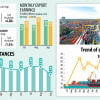

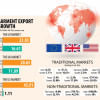
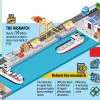


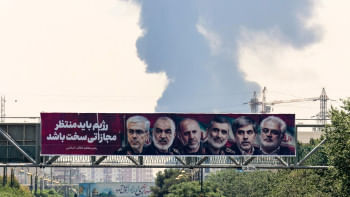
Comments